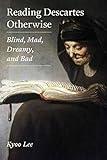Reading Descartes Otherwise : Blind, Mad, Dreamy, and Bad / Kyoo Lee.
Material type: TextPublisher: New York, NY : Fordham University Press, [2014]Copyright date: ©2014Description: 1 online resource (240 p.)Content type:
TextPublisher: New York, NY : Fordham University Press, [2014]Copyright date: ©2014Description: 1 online resource (240 p.)Content type: - 9780823244843
- 9780823261260
- 194 23
- online - DeGruyter
| Item type | Current library | Call number | URL | Status | Notes | Barcode | |
|---|---|---|---|---|---|---|---|
 eBook
eBook
|
Biblioteca "Angelicum" Pont. Univ. S.Tommaso d'Aquino Nuvola online | online - DeGruyter (Browse shelf(Opens below)) | Online access | Not for loan (Accesso limitato) | Accesso per gli utenti autorizzati / Access for authorized users | (dgr)9780823261260 |
Frontmatter -- Contents -- Acknowledgments -- References and Abbreviations for the Works of Descartes -- Preamble I. If Descartes Remains Overread and Underexplored . . . -- Preamble II. Descartes Needs Rereading -- A Stage Setup. Reframing “Jeux Descartes” -- Scene 1. Blind Vision: A Photographic Touch -- Scene 2. Elastic Madness: An Allegorical Comedy -- Scene 3. Philopoetic Somnambulism: An Imaginary Freedom -- Scene 4. Cornered Reflection: With and around an Evil Genius -- Notes -- References -- index
restricted access online access with authorization star
http://purl.org/coar/access_right/c_16ec
Focusing on the first four images of the Other mobilized in Descartes’ Meditations—namely, the blind, the mad, the dreamy, and the bad—Reading Descartes Otherwise casts light on what have heretofore been the phenomenological shadows of “Cartesian rationality.” In doing so, it discovers dynamic signs of spectral alterity lodged both at the core and on the edges of modern Cartesian subjectivity.Calling for a Copernican reorientation of the very notion “Cartesianism,” the book’s series of close, creatively critical readings of Descartes’ signature images brings the dramatic forces, moments, and scenes of the cogito into our own contemporary moment. The author patiently unravels the knotted skeins of ambiguity that have been spun within philosophical modernity out of such clichés as “Descartes, the abstract modern subject” and “Descartes, the father of modern philosophy”—a figure who is at once everywhere and nowhere. In the process, she revitalizes and reframes the legacy of Cartesian modernity, in a way more mindful of its proto-phenomenological traces.
Mode of access: Internet via World Wide Web.
In English.
Description based on online resource; title from PDF title page (publisher's Web site, viewed 03. Jan 2023)


